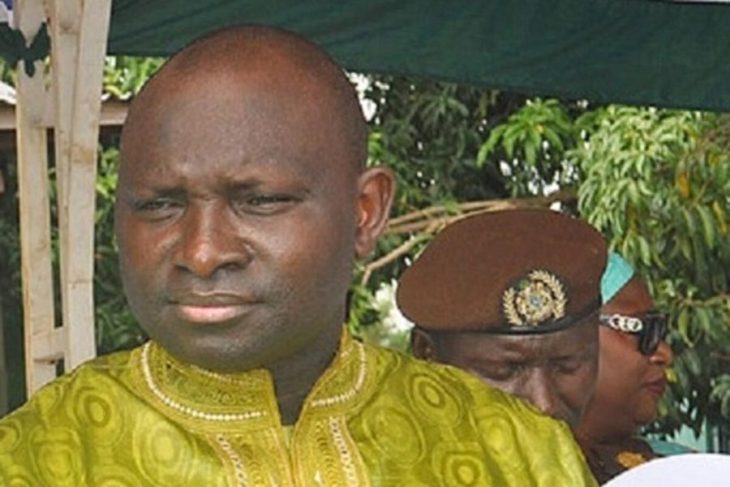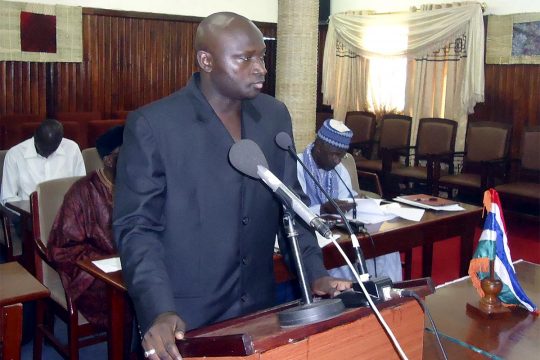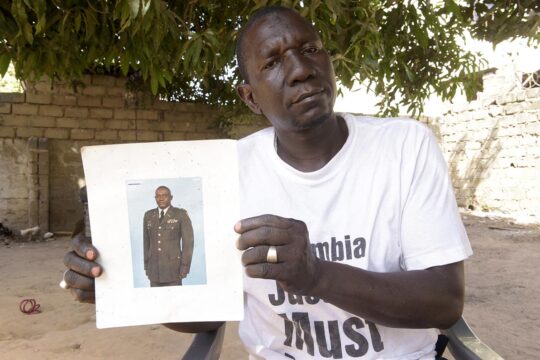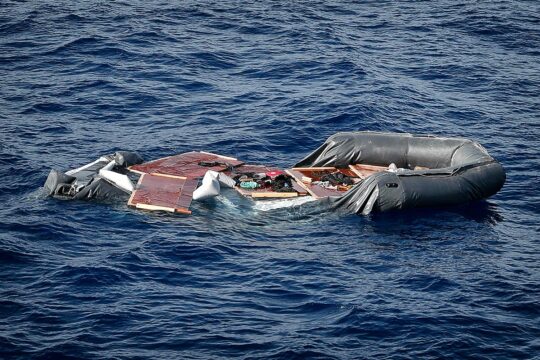In the Gambia, Ousman Sonko was Interior Minister under ex-dictator Yahya Jammeh from 2006 to 2016. In Switzerland, he is accused of having had command responsibility in widespread abuses committed by agents and bodies under his control, including the police, National Intelligence Agency, notorious hit-squad the “Junglers”, and prison services.
The Gambia’s Truth, Reconciliation and Reparations Commission (TRRC), whose report was published in December, includes him as one of the individuals who should be prosecuted. It portrays him as a close member of Jammeh’s regime, which committed widespread abuses against civilians, including torture, extrajudicial killings, mock executions and sexual violence. Many of these crimes took place in prisons and secret detention centres falling under Sonko’s authority.
Arrested in Switzerland in January 2017, Sonko has been in jail ever since. His case was brought on a complaint from Geneva-based NGO TRIAL International, initially for torture, which was then requalified as crimes against humanity. To Sonko’s lawyer, keeping him in pre-trial detention in Switzerland for five years while the Office of the Attorney General continues to investigate is an abuse of his rights. “I can understand that in a universal jurisdiction case against a former minister from a third country, it could be considered that there could be a risk of evasion or interfering with the process. But that does not mean you can dispense with his rights,” Sonko’s lawyer Philippe Currat told Justice Info. “He has been in preventive detention for five years without being informed of any precise charge. They say crime against humanity, but without any precision nor individualisation.”
Indictment this year?
Switzerland’s Office of the Attorney General (OAG) is notoriously slow and under-resourced on international crimes cases. TRIAL International has been critical in the past, but its director Philip Grant thinks there are now reasons to hope that the Sonko case is speeding up, with a possible indictment this year. He points to the fact that Swiss investigators have been to Gambia several times, that they have obtained cooperation from the government and from the TRRC, and that there is more court scrutiny each time prosecutors seek to renew Sonko’s remand.
Switzerland has a new Attorney General who took office on January 1, and might give more priority to prosecuting international crimes. “They cannot just drag on for years with these cases that are so important,” says Grant. “There are many reasons why they should increase capacity on international crimes cases, but it will depend on the new Attorney General’s strategic vision.”
“New evidence”
Grant points out that Swiss law allows for longer periods of pre-trial detention than countries like Germany and the US which have also taken Gambia cases under the principle of universal jurisdiction. Under Swiss law, suspects can be remanded in custody longer and more often than in neighbouring countries. Sonko’s remand has to be approved by a court every three months, and so far the court has approved it. On September 1, 2021, the Appeals Court of Switzerland’s Federal Criminal Court also pointed to new evidence in granting the prosecutors’ request for more time to complete investigations. It cited Gambian witnesses brought to Bern or interviewed in Gambia who spoke of Sonko as being close to Jammeh, and who said Sonko was present and aware of various serious abuses committed.
Sonko, if he is finally brought to trial, will be only the second person to be tried by a Swiss civil court for international crimes. Unlike in the case of Liberian Alieu Kosiah, who was in June 2021 sentenced to 20 years for war crimes, Swiss investigators in the Gambian case have been to the country to gather evidence and interview witnesses. The Office of the Attorney General confirmed in an E-mail to Justice Info that “a delegation of the OAG and fedpol [Federal Office of Police] travelled to The Gambia several times in the context of the proceedings in order to collect evidence in the context of mutual legal assistance, including to conduct interrogations”.
Interviewed by our correspondent in The Gambia, Ajie Adam Ceesay and Baffo Jeng, Gambian state lawyers facilitating the Swiss prosecutors’ visit on the advice of Gambia’s Justice Minister, confirmed to Justice Info that they “arranged those interviews” for the Swiss. “We are not part of the process directly. They do some interviews at our conference room,” they said. The interviews would often be through a video link, where both Sonko and his lawyers would also partake.
Little information has leaked about which witnesses or possible sites the Swiss team may have wanted to see. However, based on the records of Gambia’s Truth Commission, witnesses might include Binta Jamba, who claimed to have been raped by Ousman Sonko; Lalo Jaiteh, who claimed to have been privy to circumstances around the murder of Almamo Manneh, a one-time ally of the ex-ruler who was reportedly murdered by Sonko and others on Jammeh’s orders; and witnesses in the murder case of West African migrants, since Sonko is one of the people said to have participated in a cover-up after their executions.
The TRRC report found that the then Interior Minister was one of the people who “planned and organized” the unlawful killing of Almamo Manneh, a member of the State Guards who was accused of being a coup plotter. It also lists Sonko as one of the “enablers and accomplices” in the “arrest, enforced disappearance, and extrajudicial execution in The Gambia of over 67 unarmed West African economic migrants who the Jammeh regime perceived as mercenaries”.
The report also found that the former Interior Minister was implicated in the unlawful killing of nine prison inmates in August 2012, and in the attempted assassination of lawyer Ousman Sillah.
Sexual violence
One of the big questions is whether Sonko could be charged in Switzerland with rape and/or sexual violence. Grant says the TRRC, although it is not a court or a prosecutors’ office, confirmed in its report that “a lot of sexual offences were carried out by the system of which Sonko was a leading figure”.
Court decisions to renew Sonko’s remand, which include looking at evidence gathering by the Office of the Attorney General, suggest this is already on the Swiss investigators’ radar. If such charges were brought, would it be for command responsibility only, or also direct rape as alleged by Binta Jamba before the TRRC?
According to the TRRC report, Jamba, a member of the police, testified that Sonko sexually harassed and raped her more than 70 times after the death of her husband Almamo Manneh, as well as beating her and threatening her with a pistol. The report concludes that “in view of the above, Ousman Sonko is responsible for the several rapes and torture of Binta Jamba”.
If and when Sonko is tried in Switzerland, it could be a powerful symbol. Given that Gambia’s ex-president Jammeh is in exile in Equatorial Guinea, under the protection of its long-time leader Teodoro Obiang Nguema Mbasogo, Sonko could become the highest person in Jammeh’s regime brought to justice. It could be important for transitional justice in Gambia. It could also be important for Switzerland’s commitment to prosecuting international crimes.








